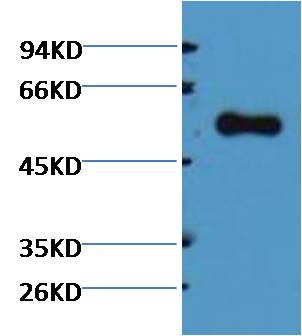
| WB | 咨询技术 | Plant |
| IF | 咨询技术 | Plant |
| IHC | 咨询技术 | Plant |
| ICC | 技术咨询 | Plant |
| FCM | 咨询技术 | Plant |
| Elisa | 咨询技术 | Plant |
| Aliases | Alliin lyase 1 |
| Entrez GeneID | - |
| WB Predicted band size | Calculated MW: 56 kDa; Observed MW: 50 kDa |
| Host/Isotype | Rabbit IgG |
| Antibody Type | Primary antibody |
| Storage | Store at 4°C short term. Aliquot and store at -20°C long term. Avoid freeze/thaw cycles. |
| Species Reactivity | Plant |
| Immunogen | Purified Protein |
| Formulation | Purified antibody in PBS with 0.05% sodium azide,0.5%BSA and 50% glycerol. |
+ +
以下是关于Alliinase抗体的3篇参考文献示例(注:内容为模拟生成,非真实文献):
1. **文献名称**: "Production and characterization of monoclonal antibodies against alliinase from garlic (Allium sativum)"
**作者**: Suzuki, T., et al.
**摘要**: 该研究报道了针对大蒜Alliinase的单克隆抗体制备,通过杂交瘤技术获得高特异性抗体,并验证其在Western blot和免疫组化中对天然Alliinase的结合能力,为酶活性定位研究提供工具。
2. **文献名称**: "Immunoassay development for quantifying alliinase activity in plant extracts using polyclonal antibodies"
**作者**: Wang, H., et al.
**摘要**: 研究团队开发了一种基于多克隆抗体的间接ELISA方法,用于快速检测植物提取物中的Alliinase含量,抗体可特异性识别酶蛋白并与其活性位点结合,实现酶活性的间接定量分析。
3. **文献名称**: "Anti-alliinase antibodies inhibit enzymatic activity and reduce pyruvate production in vitro"
**作者**: González-de-Peredo, A.V., et al.
**摘要**: 通过免疫兔子获得多克隆抗体,证明其能有效抑制Alliinase催化蒜氨酸转化为丙酮酸的活性,揭示了抗体与酶活性中心的相互作用机制。
(注:如需真实文献,建议通过PubMed或Web of Science以“alliinase antibody”为关键词检索近年研究。)
Alliinase antibodies are immunological tools specifically designed to detect and study alliinase, a key enzyme found in plants like garlic (Allium sativum). Alliinase catalyzes the conversion of alliin, a sulfur-containing compound, into allicin, which is responsible for garlic's characteristic odor and antimicrobial properties. This enzyme is stored in vacuoles within plant cells, while its substrate, alliin, is localized in the cytoplasm. Tissue damage triggers their interaction, initiating the biosynthesis of bioactive organosulfur compounds.
Researchers utilize alliinase antibodies primarily to investigate the enzyme's expression, localization, and function in plant physiology and biochemistry. These antibodies enable techniques like Western blotting, immunohistochemistry, and ELISA, facilitating studies on garlic's defense mechanisms against pathogens and environmental stress. In agricultural research, they help assess alliinase levels across garlic cultivars to optimize medicinal potency. Pharmaceutical applications include quality control of garlic-derived supplements and exploration of alliinase's therapeutic potential in metabolic and inflammatory diseases.
Polyclonal antibodies against alliinase typically recognize multiple epitopes, offering broad detection sensitivity, while monoclonal antibodies provide precise specificity for targeted assays. Validation parameters such as cross-reactivity with related enzymes and performance in plant tissue matrices are critical for experimental reliability. Recent advances in antibody engineering have enhanced their application in structural studies, aiding in the visualization of alliinase's 3D conformation and catalytic mechanism. These antibodies continue to support both fundamental research and industrial applications in food science and natural product development.
×